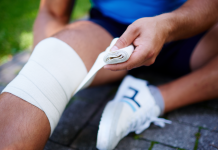POSTURAL CHANGES – MUSCLES IMBALANCES
Your body will experience many changes while pregnant. Indeed, your hips have probably tilted forward (Lower Crossed Syndrome – LCS, also know as distal or pelvic crossed syndrome) and your shoulders are probably rounded (Upper Crossed Syndrome – UCS, also known as proximal or shoulder girdle crossed syndrome). This misalignment is the source of pain you might be suffering. Indeed, certain muscles becoming tightened, while other muscles become lengthened and inhibited in order to stabilize the body, and to adapt to the growing foetus and uterus.

AFTER BIRTH
Returning to sport after giving birth takes time and it’s always a good idea to see your good doctor before engaging in any form of sport. After childbirth, like any major operation or hospitalisation, it’s advisable to rest, get plenty of sleep and simply recuperate. This includes NO heavy lifting nor intensive movement of the body especially in first three to six weeks. You can, however, work on your pelvic-floor exercises and walk. Take it easy; and allow your body the chance to recover. Once past the 6-week postnatal check-up, you can then consider starting with low impact exercises. By the 16th week, most women have been able to resume their previous sport activities. Listen to your body as you might feel tired due to the lack of sleep, breastfeeding.
- Some tips when running:
- Keep well hydrated
- Run during the coolest hours of the daylight, early morning or in the evening, as your body temperature gets higher while pregnant.
- Don’t run a marathon while pregnant. You could put your health and the baby’s health in danger.
- Never run to the point of exhaustion or breathlessness. If you feel tired, don’t push yourself, and just take a break.
- Wear a heart rate monitor to help limit excessive speed and effort.
- As your due date approaches, slow down your running for lower impact activities like swimming and walking.
CONCLUSION
As a conclusion, while you can still run when pregnant, take some precautions and listen to your body. If you are not sure, discuss it with your doctor. Running while pregnant is good; it improves your sleep quality, prevents you from gaining excessive weight, lessens back pains, and reduces delivery complications and time spent in labour. However, don’t exceed your capacity and don’t raise the bar too high.
Enjoy your run, your pregnancy and stay safe!
 Nikki Yeo
Nikki Yeo
Nikki Yeo is a safe training movement advocate and also Head of Sports Marketing at GoInternationalGroup.com. Her fitness dogma is founded on the belief that physical fitness makes the greatest impact on our quality of life. She believes that her purpose isn’t just about improving fitness, but about changing lives. Nikki is a Certified Specialist by Functional Movement System, Certified Personal Trainer by American Council on Exercise, Health & Fitness Professional of “Exercise is Medicine” awarded by the American College of Sports Medicine and a Barefoot Training Specialist by Evidence Based Fitness Academy America. For more about Nikki, visit www.nikkiyeo.com
































































































